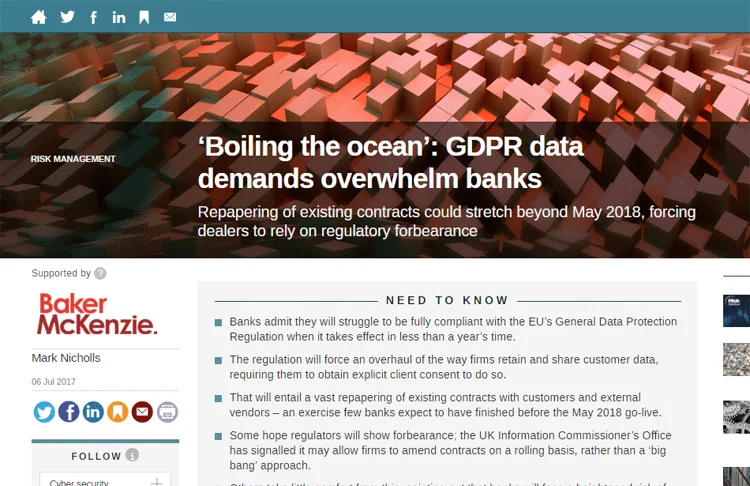
Content funding on Risk.net
Content quality is at the heart of Risk.net’s success. We employ an editorial team of 40 around the globe who are proud of the reputation we have built for objective, in-depth reporting of complex topics.
We often receive enquiries from third parties operating in the markets we cover, who want to align themselves with our quality content. This is natural and forms part of any commercial publisher’s operation. We aim to be fully transparent with our readers, so will always label this content in one of two ways.
Supported by
This content is editorially independent, but has been funded – or part-funded – by a third party that wants to align itself with a subject. This label may appear on an article, a topic, or a section of the site.

In some cases, funding is accepted for work that is already underway; in others, it is accepted for new projects. The funder may suggest topics for coverage, but the relevant commissioning editor is under no obligation to accept those suggestions. The suitability of any funder must first be approved by the editor-in-chief.
The content is written and edited by Risk.net journalists, or those we have approved, using the same processes and standards applied to the rest of our journalism. Risk.net does not show this content to funders for approval.
Sponsor content
This material is paid for by the third party and is produced without the involvement of Risk.net’s editorial team – sometimes it will be written by the third party, and sometimes by a freelance journalist at the direction of the third party. Traditionally, these pieces are known as ‘sponsored statements’ or ‘advertorials’.

All sponsor content is clearly labelled, so any reader of Risk.net can easily distinguish between a piece written by our editorial team and a piece written by a sponsor, in accordance with guidelines set by the Advertising Standards Authority (UK) and the Federal Trade Commission (US).
The acceptance of both ‘supported by’ and ‘sponsor content’ in no way affects our editorial position. Our editorial team works independently from our commercial team, and is free to challenge the activities of companies and organisations that are also our advertisers and sponsors.
Only users who have a paid subscription or are part of a corporate subscription are able to print or copy content.
To access these options, along with all other subscription benefits, please contact info@risk.net or view our subscription options here: http://subscriptions.risk.net/subscribe
You are currently unable to print this content. Please contact info@risk.net to find out more.
You are currently unable to copy this content. Please contact info@risk.net to find out more.
Copyright Infopro Digital Limited. All rights reserved.
As outlined in our terms and conditions, https://www.infopro-digital.com/terms-and-conditions/subscriptions/ (point 2.4), printing is limited to a single copy.
If you would like to purchase additional rights please email info@risk.net
Copyright Infopro Digital Limited. All rights reserved.
You may share this content using our article tools. As outlined in our terms and conditions, https://www.infopro-digital.com/terms-and-conditions/subscriptions/ (clause 2.4), an Authorised User may only make one copy of the materials for their own personal use. You must also comply with the restrictions in clause 2.5.
If you would like to purchase additional rights please email info@risk.net
More on Risk management
Big banks love their climate vendors; small banks, not so much
Risk Benchmarking: Lenders with blue-chip loan books more likely to favour climate tools, research finds
Mob rule: populism’s rise pits banks against the people
Trump and fellow mavericks are reshaping politics, leaving banks scrambling to adjust to new and unpredictable risks
JSCC considers default fund consolidation
Japanese clearing house looks for efficiency gains amid expansion of clearing products and influx of international firms
EU clearing houses pressured to diversify cloud vendors
CROs and regulators see tech concentration risk as a barrier to operational resilience
Why better climate data doesn’t always mean better decision-making
Risk Benchmarking research finds model and systems integration challenges almost as limiting to effective climate risk management
CanDeal looks to simplify third-party risk management
Six-bank vendor due diligence utility seeks international reach
Market players warn against European repo clearing mandate
Regulators urged to await outcome of US mandate and be wary of risks to government bond liquidity
Italy’s spread problem is not (always) a credit story
Occasional doubts over Italy’s role in the monetary union adds political risk premium, argues economist







